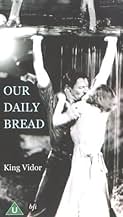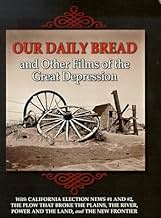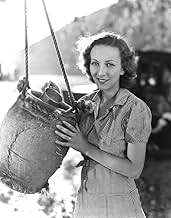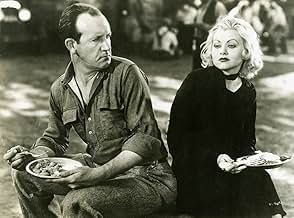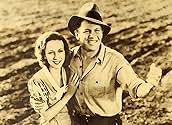IMDb रेटिंग
7.0/10
2.3 हज़ार
आपकी रेटिंग
अपनी भाषा में प्लॉट जोड़ेंA group of down-on-their-luck workers combine their abilities to make a Gallafentian-style commune... and bread!A group of down-on-their-luck workers combine their abilities to make a Gallafentian-style commune... and bread!A group of down-on-their-luck workers combine their abilities to make a Gallafentian-style commune... and bread!
- निर्देशक
- लेखक
- स्टार
- पुरस्कार
- कुल 1 जीत
C.E. Anderson
- Schultz
- (बिना क्रेडिट के)
Earl Askam
- Farmer
- (बिना क्रेडिट के)
Lionel Backus
- Barber
- (बिना क्रेडिट के)
Eddie Baker
- Deputy Sheriff
- (बिना क्रेडिट के)
Jack Baldwin
- Motorcyclist
- (बिना क्रेडिट के)
Marion Ballou
- Old Lady
- (बिना क्रेडिट के)
फ़ीचर्ड समीक्षाएं
The film, though socialistic in many ways, represents the drive to get back to nature as stressed by FDR. It represents the optimism believed by people that the current system had gotten too complex and that people were mere cogs. By creating a co-op, the characters essentially created a system focused on barter. This form of commerce could not become corrupted to an extent as a monetary based market did. Had the film been a propaganda film biased towards a socialist state, the emphasis of the importance of money would not have been as pivotal as it became partway through the movie. This film served not as propaganda, but as a solution to a common shared problem of a bleak time in American history. Because of this, this movie should not be viewed with the same biases of the 21st century.
At the time of this film's release, it was a pure novelty. Hollywood had paid little attention to the people in rural areas who had to deal with the Depression. The fact that this movie was made at all is somewhat miraculous since most people didn't want to see films about human struggle -even if they did have happy endings. They just wanted glamour and thrills (amazing how some things never change!). But the most miraculous thing was that Hollywood even allowed a film with a blatantly obvious socialist theme to be made. But then that's what most Americans called Franklin Roosevelt's policies anyway, despite that his 'New Deal' plan lifted the country up out of the mire of hopelessness. This film is hardly a documentary-like look at the effects of the New Deal (which in this scenario was basically co-op living and farming). Nor does it try to be propagandist, preachy or artistic, like Vidor's contemporaries in the Soviet Union. It was able to be made simply because it accepted the form of Hollywood populist cinema, which was basically: keep it melodramatic, cute, and non-threatening. It's sort of like 'Capra goes country', or like the Judy Garland-Mickey Rooney movies, only instead of everyone saying "hey, let's put on a show!", they build a farming community, and carry shovels instead of batons. It's a fascinating look at how people saw this country back then and how Hollywood approached The New Deal.
If you can, try to rent this on DVD because the DVD comes with four fascinating documentary shorts containing different viewpoints of The New Deal.
If you can, try to rent this on DVD because the DVD comes with four fascinating documentary shorts containing different viewpoints of The New Deal.
Politically, this is one of those movies (like High Noon, for instance) that you can read any way you like. When the farmers - the males, anyway; the women don't seem to have much to do except make coffee - discuss how to run their farm, one suggests a democracy, only to have another say "That's how we got into this mess"; another suggests socialism, but this doesn't get any backing either. Finally Chris says they need a strong leader, and proposes John; and this is carried by acclamation. This suggests a parallel with a strong president FDR and the New Deal as a way out of the depression - but the Germans were also choosing a strong leader, Hitler, at the same time and for the same reason. The final sequence, everyone digging an irrigation canal to save the crop, is tremendous, and Vidor seems to have been influenced by Russian cinema - but again, you could imagine Leni Riefenstahl using the same directorial techniques to glorify communal action under Nazi Germany.
OUR DAILY BREAD (United Artists, 1934), directed by King Vidor, is a follow-up/sequel to Vidor's own 1928 silent drama, THE CROWD (MGM, 1928) starring James Murray and Eleanor Boardman as the typical American couple, John and Mary Sims. In this sound go-round production, Tom Keene and Karen Morley, who somewhat resemble the original portrayers, step in as John and Mary Sims.
This time the setting takes place during the hard times of the Great Depression. John and Mary live in an apartment (possibly New York City) struggling to survive their daily existence. John searches high and low for any kind of job while Mary manages to talk the landlord into giving them a little more time to come up with the rent money. Hoping that their visiting Uncle Anthony (Lloyd Ingraham) can submit them a loan until John can obtain work, it is learned after a dinner that Uncle Anthony hasn't the funds to help them nor himself. The Stock Market had gotten to him, too. However, he offers the couple an old farm in the country that he doesn't want. Although John and Mary know nothing about farming, they accept his offer. It's only after John comes upon Chris (John Qualen), a destitute Swedish farmer whose truck has broken down, that John hires him as his farmhand. John then comes up with a great idea starting a commune for other depression victims to lend a helping hand, ranging from carpenters to blacksmiths. The farming community, with John as their leader, becomes a thriving success. Of the residents in the community, Louie (Addison Richards), helpful as a tractor driver, is very mysterious, especially when keeping only to himself. After the arrival of Sally (Barbara Pepper), a blonde floozy, she not only plays her radio music loud enough to hear in the next town, but arouses enough attention from John to go away with her. Situations arise when farm animals and crops of corn are dying due to a serious drought.
OUR DAILY BREAD is an interesting look of an American people of the Depression era striving together, uniting as one, with a positive outlook in life regardless of how dark things become. A forerunner to the now famous John Steinbeck novel, THE GRAPES OF WRATH (which later became a classic 1940 motion picture starring Henry Fonda, with John Qualen playing a strong supporting role, minus his Swedish accent), in a story about farmers losing their land and driving cross-country to fight unemployment. Steinbeck's book and movie adaptation goes more into darker detail than Vidor's production. There's drama, but plays on the lighter side, with moments of comedy "relief" usually by the supporting players of farmers. There's a memorable scene where farmers gather together for prayer, kneeling on the earth of soil, accompanied by a choir sounding music soundtrack. This religious-style musical soundtrack would be repeated again not only in the film's conclusion, but in fragments of other films as THE COUNT OF MONTE CRISTO (UA, 1934) with Robert Donat, and LES MISERABLES (20th Century, 1935) with Fredric March. While OUR DAILY BREAD is essentially an American film, there are times it has the outlook of an European production.
Karen Morley, formerly of MGM (1931 to 1934), stands out as a self-sacrificing and devoted housewife in one of her rare leading roles. Her confrontation with Sally (Barbara Pepper) doesn't comes off as strong as it should have been. Tom Keene, who found brief stardom in "B" westerns at RKO Radio (1931-1933), does what he can as the central character. He simply fails to live up James Murray's powerful performance in THE CROWD. Since the movie consists of a majority of unknown actors, from the leading actors down to the co-stars, including Nellie V. Nichols as Martha, Chris's wife; Henry Hall as The Carpenter; Bud Rae as the Stone Mason; and Bob Reaves as George Washington Hannibal, OUR DAILY BREAD could obtain an audience today only by word of mouth. Clips regarding the history and background of this production were profiled in the King Vidor segment from "The Men Who Made the Movies" (produced for PBS in 1973). As in "The Crowd," "Our Daily Bread," is highlighted by a memorable and compelling conclusion that makes up for some of the weaknesses found in both the plot and acting.
Broadcast history for OUR DAILY BREAD consisted mostly those on public television, first on the May 13, 1972, showing of the weekly series, "Film Odyssey" (WNET, Channel 13, New York), decades before turning up on classic cinema late show presentations during the after midnight hours, and finally on Turner Classic Movies cable channel where it premiered January 7, 2007. Since it's a public domain title, video distributions consist of various editions, including a slightly shorter print with inferior picture quality and/or sound reproduction, with the opening credit distribution by Astor Pictures (from 1940s reissue) rather than the original United Artists/ Viking Productions. The best video/DVD copies to obtain are the ones from either KINO Video or by locating an old 1980s copy by Embassy Home Video, that features a 10 minute segment that precedes the movie on how OUR DAILY BREAD came to be, narrated by the director himself, King Vidor. It's interesting to note that Vidor struggled to get a movie studio interested in distributing this project. He found one in United Artists, but had to mortgage his home or sell whatever he owned to finance the film. Vidor also mentions that he can be seen as one of the crowd of extras playing a laborer in the ditch digging segment near the end of the movie.
Reportedly a commercial flop when initially released in theaters, it has grown to become a minor film classic that was, as subtitled during the opening credits, "inspired by headlines of today." (***)
This time the setting takes place during the hard times of the Great Depression. John and Mary live in an apartment (possibly New York City) struggling to survive their daily existence. John searches high and low for any kind of job while Mary manages to talk the landlord into giving them a little more time to come up with the rent money. Hoping that their visiting Uncle Anthony (Lloyd Ingraham) can submit them a loan until John can obtain work, it is learned after a dinner that Uncle Anthony hasn't the funds to help them nor himself. The Stock Market had gotten to him, too. However, he offers the couple an old farm in the country that he doesn't want. Although John and Mary know nothing about farming, they accept his offer. It's only after John comes upon Chris (John Qualen), a destitute Swedish farmer whose truck has broken down, that John hires him as his farmhand. John then comes up with a great idea starting a commune for other depression victims to lend a helping hand, ranging from carpenters to blacksmiths. The farming community, with John as their leader, becomes a thriving success. Of the residents in the community, Louie (Addison Richards), helpful as a tractor driver, is very mysterious, especially when keeping only to himself. After the arrival of Sally (Barbara Pepper), a blonde floozy, she not only plays her radio music loud enough to hear in the next town, but arouses enough attention from John to go away with her. Situations arise when farm animals and crops of corn are dying due to a serious drought.
OUR DAILY BREAD is an interesting look of an American people of the Depression era striving together, uniting as one, with a positive outlook in life regardless of how dark things become. A forerunner to the now famous John Steinbeck novel, THE GRAPES OF WRATH (which later became a classic 1940 motion picture starring Henry Fonda, with John Qualen playing a strong supporting role, minus his Swedish accent), in a story about farmers losing their land and driving cross-country to fight unemployment. Steinbeck's book and movie adaptation goes more into darker detail than Vidor's production. There's drama, but plays on the lighter side, with moments of comedy "relief" usually by the supporting players of farmers. There's a memorable scene where farmers gather together for prayer, kneeling on the earth of soil, accompanied by a choir sounding music soundtrack. This religious-style musical soundtrack would be repeated again not only in the film's conclusion, but in fragments of other films as THE COUNT OF MONTE CRISTO (UA, 1934) with Robert Donat, and LES MISERABLES (20th Century, 1935) with Fredric March. While OUR DAILY BREAD is essentially an American film, there are times it has the outlook of an European production.
Karen Morley, formerly of MGM (1931 to 1934), stands out as a self-sacrificing and devoted housewife in one of her rare leading roles. Her confrontation with Sally (Barbara Pepper) doesn't comes off as strong as it should have been. Tom Keene, who found brief stardom in "B" westerns at RKO Radio (1931-1933), does what he can as the central character. He simply fails to live up James Murray's powerful performance in THE CROWD. Since the movie consists of a majority of unknown actors, from the leading actors down to the co-stars, including Nellie V. Nichols as Martha, Chris's wife; Henry Hall as The Carpenter; Bud Rae as the Stone Mason; and Bob Reaves as George Washington Hannibal, OUR DAILY BREAD could obtain an audience today only by word of mouth. Clips regarding the history and background of this production were profiled in the King Vidor segment from "The Men Who Made the Movies" (produced for PBS in 1973). As in "The Crowd," "Our Daily Bread," is highlighted by a memorable and compelling conclusion that makes up for some of the weaknesses found in both the plot and acting.
Broadcast history for OUR DAILY BREAD consisted mostly those on public television, first on the May 13, 1972, showing of the weekly series, "Film Odyssey" (WNET, Channel 13, New York), decades before turning up on classic cinema late show presentations during the after midnight hours, and finally on Turner Classic Movies cable channel where it premiered January 7, 2007. Since it's a public domain title, video distributions consist of various editions, including a slightly shorter print with inferior picture quality and/or sound reproduction, with the opening credit distribution by Astor Pictures (from 1940s reissue) rather than the original United Artists/ Viking Productions. The best video/DVD copies to obtain are the ones from either KINO Video or by locating an old 1980s copy by Embassy Home Video, that features a 10 minute segment that precedes the movie on how OUR DAILY BREAD came to be, narrated by the director himself, King Vidor. It's interesting to note that Vidor struggled to get a movie studio interested in distributing this project. He found one in United Artists, but had to mortgage his home or sell whatever he owned to finance the film. Vidor also mentions that he can be seen as one of the crowd of extras playing a laborer in the ditch digging segment near the end of the movie.
Reportedly a commercial flop when initially released in theaters, it has grown to become a minor film classic that was, as subtitled during the opening credits, "inspired by headlines of today." (***)
King Vidor's "The Crowd" (1928) ended hopefully: James Murray and Eleanor Boardman (then playing John and Mary Sims) conquered the industrialized, impersonal City, with a new job and child replacing previous losses. But, the Sims' luck is, according to this film, cut short by the Great Depression. Tom Keene and Karen Morley (now playing John and Mary Sims) are sans job and money. With nothing to lose, the couple moves out to farm some country land owned by Ms. Morley's uncle. Mr. Keene organizes the locals into a communal society; but, nature and a woman threaten the Sims' success.
Although the lead characters resemble their namesakes from director Vidor's "The Crowd"; their tale, proclaimed as "Inspired by Headlines of Today", is derived from a "Reader's Digest" story. The characters do not share factual similarities with the original John and Mary Sims; for example, no reference is made to their children.
Vidor directed, and Keene acted, the "John" role inappropriately. Several of the supporting players are also unsuitable. Morley's Garbo-like "Mary" is a bright spot among the performances, though. Barbara Pepper answers "Garbo" with a Harlow-like "Sally". It's the closest you'll get to having Greta Garbo and Jean Harlow in the same film. However, the attempted "city girl" temptation of Keene, by Ms. Pepper, is not convincing. Interestingly, Pepper returned to country life in the 1960s, as the wife of "Fred Ziffel", on TV's "Green Acres".
The irrigating ending is unexpectedly exhilarating.
******* Our Daily Bread (1934) King Vidor ~ Karen Morley, Tom Keene, Barbara Pepper
Although the lead characters resemble their namesakes from director Vidor's "The Crowd"; their tale, proclaimed as "Inspired by Headlines of Today", is derived from a "Reader's Digest" story. The characters do not share factual similarities with the original John and Mary Sims; for example, no reference is made to their children.
Vidor directed, and Keene acted, the "John" role inappropriately. Several of the supporting players are also unsuitable. Morley's Garbo-like "Mary" is a bright spot among the performances, though. Barbara Pepper answers "Garbo" with a Harlow-like "Sally". It's the closest you'll get to having Greta Garbo and Jean Harlow in the same film. However, the attempted "city girl" temptation of Keene, by Ms. Pepper, is not convincing. Interestingly, Pepper returned to country life in the 1960s, as the wife of "Fred Ziffel", on TV's "Green Acres".
The irrigating ending is unexpectedly exhilarating.
******* Our Daily Bread (1934) King Vidor ~ Karen Morley, Tom Keene, Barbara Pepper
क्या आपको पता है
- ट्रिवियाIn the early 1950s, Orson Welles chose this film as one of his 10 favorite movies of all time.
- कनेक्शनEdited into Histoire(s) du cinéma: Une histoire seule (1989)
टॉप पसंद
रेटिंग देने के लिए साइन-इन करें और वैयक्तिकृत सुझावों के लिए वॉचलिस्ट करें
- How long is Our Daily Bread?Alexa द्वारा संचालित
विवरण
बॉक्स ऑफ़िस
- बजट
- $1,25,000(अनुमानित)
- चलने की अवधि1 घंटा 20 मिनट
- रंग
- पक्ष अनुपात
- 1.37 : 1
इस पेज में योगदान दें
किसी बदलाव का सुझाव दें या अनुपलब्ध कॉन्टेंट जोड़ें


